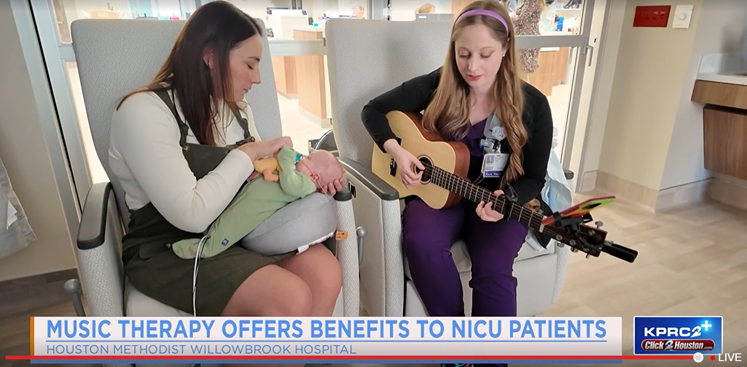Meet Hannah Mata, whose work in the NICU was featured by KRPC 2 last month!

Since high school, Hannah Mata has known that she wanted to become a music therapist. She says music therapy combines her interests in medicine, neurology, psychology, health care, and music. After graduating with a bachelor’s degree in music therapy from West Texas A&M University, she interned at TIRR Memorial Hermann The Woodlands. She then furthered her education by earning a master’s degree in music therapy from Texas Woman’s University.
Hannah has worked on the NICU at Houston Methodist Willowbrook since November 2021. “I had always remembered this hospital as being someplace special and knew this was where I wanted to be,” she says.
At Houston Methodist Willowbrook, Hannah provides music therapy to babies and their parents. Music therapy is individualized for each patient to meet specific treatment goals. Hannah assesses infants and works with the babies’ parents and staff members to determine whether and how to provide music therapy. In the NICU, the type of music that Hannah provides is specific to the baby’s needs and cultural background.
One music therapy technique that Hannah uses often is Multimodal Neurologic Enhancement, which gradually combines singing lullabies, developmentally appropriate touch, and rocking. This helps premature infants develop their neurological system, improve their tolerance to being outside of the womb early, and gain weight. Hannah teaches this method to the babies’ parents to promote bonding within the hospital, which can often be a stressful environment. She also teaches parents how to use music in various ways that they can continue to apply even after being discharged from the hospital.
Around 18 weeks into gestation, babies can hear sounds in the womb, making music and their mother’s voice familiar to them before they are even born. Once they are born, that same music can be beneficial. “It can be comforting and soothing for the infant due to familiarity,” Hannah says. “Music is also a great way for parents to help promote their child’s language development and connect with their infant.”
Sometimes, Hannah sings lullabies to the babies in their mother’s native language and voice range at the bedside during routine NICU procedures. She ensures that the lullabies are within a specific musical criteria that protects the premature infants from overstimulation. Music therapists incorporate techniques such as entrainment, matching the tempo and rhythm of the music to the infant’s physiological responses, to reduce pain and stabilize vital signs. This approach, supported by research and practice, demonstrates how personalized music interventions can effectively achieve these desired effects. Unlike with typical singing, music therapists carefully monitor patients and adjust the music they provide to reduce harm and meet treatment goals.
In the future, Hannah plans to continue practicing music therapy in the NICU to provide long-term benefits for infants and their families, conducting more research on the benefits of music therapy for infants and caregivers, and spreading music therapy awareness to the community. Hannah’s work at Houston Methodist serves as a cornerstone for these aspirations, continuing to exemplify the positive impact of music therapy in healthcare settings.